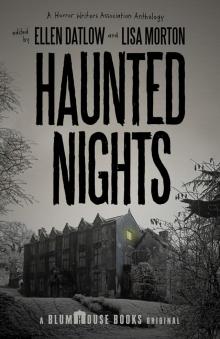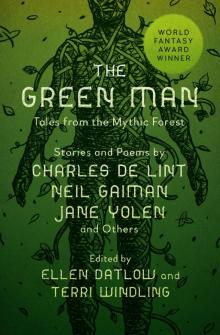- Home
- Ellen Datlow
The Best of the Best Horror of the Year Page 5
The Best of the Best Horror of the Year Read online
Page 5
What she needed, she thought, was to find some passage for herself, some unwatched door to the outside, that she could use to slip away if things turned bad here. That was how a survivor must think. So far, the ease of life at La Bastide—the plentiful food and sunshine, the wine from the cellars, the scavenger hunts and skits, the games in the big salon, the fancy-dress parties—had bled off the worst of people’s edginess. Everyone, so far, accepted Victor’s rules. They knew that he was their bulwark against anarchy.
But: Victor had only as much authority as he had willing obedience. Food rationing, always a dangerous move, was inevitable. The ultimate loyalty of these bought-and-paid-for friends and attendants would be to themselves (except maybe for Bulgarian Bob, who seemed to really love Victor).
Only Jeff, one of the drivers, went outside now, tinkering for hours with the engines of the row of parked cars. One morning Miriam and Krista sat on the front steps in the sun, watching him.
“Look,” Krista whispered, tugging at Miriam’s sleeve with anxious, pecking fingers. Down near the roadway a dozen dogs, some with chains or leads dragging from their collars, harried a running figure across a field of withered vines in a soundless pantomime of hunting.
They both stood up, exclaiming. Jeff looked where they were looking. He grabbed up his tools and herded them both back inside with him. The front gates stayed closed after that.
Next morning Miriam saw the dogs again, from her balcony. At the foot of the driveway they snarled and scuffled, pulling and tugging at something too mangled and filthy to identify. She did not tell Krista, but perhaps someone else saw too and spread the word (there was a shortage of news in La Bastide these days, as even radio signals had become rare).
Searching for toothpaste, Miriam found Krista crying in her room. “That was Tommy Mullroy,” Krista sobbed, “that boy that wanted to make computer games from movies. He was the one with those dogs.”
Tommy Mullroy, a minor hanger-on and a late riser by habit, hadn’t made it to the cars on the morning of Victor’s hasty retreat from Cannes. Miriam was doubtful that Tommy could have found his way across the plague-stricken landscape to La Bastide on his own, and after so much time.
“How could you tell, from so far?” Miriam sat down beside her on the bed and stroked Krista’s hand. “I didn’t know you liked him.”
“No, no, I hate that horrible monkey-boy!” Krista cried, shaking her head furiously. “Bad jokes, and pinching! But now he is dead.” She buried her face in her pillow.
Miriam did not think the man chased by dogs had been Tommy Mullroy, but why argue? There was plenty to cry about in any case.
Winter had still not come; the cordwood stored to feed the building’s six fireplaces was still stacked high against the courtyard walls. Since they had plenty of water everyone used a lot of it, heated in the old boiler. Every day a load of wood ash had to be dumped out of the side gate.
Miriam and Krista took their turns at this chore together.
They stood a while (in spite of the reeking garbage overflowing the alley outside, as no one came to take it away any more). The road below was empty today. Up close, Krista smelled of perspiration and liquor. Some in the house were becoming neglectful of themselves.
“My mother would use this ash for making soap,” Krista said, “but you need also—what is it? Lime?”
Miriam said, “What will they do when all the soap is gone?”
Krista laughed. “Riots! Me, too. When I was kid, I thought luxury was to change the bedsheets every day for fresh.” Then she turned to Miriam with wide eyes and whispered, “We must go away from here, Mimi. They have no Red Sweat in my country for sure! People are farmers, villagers, they live healthy, outside the cities! We can go there and be safe.”
“More safe than in here?” Miriam shook her head. “Go in, Krista, Victor’s little boys must be crying for you. I’ll come with you and take some pictures.”
The silence outside the walls was a heavy presence, bitter with drifting smoke that tasted harsh; some of the big new villas up the valley, built with expensive synthetic materials, smoldered slowly for days once they caught fire. Now and then thick smoke became visible much further away. Someone would say, “There’s a fire to the west,” and everyone would go out on the terrace to watch until the smoke died down or drifted away out of sight on the wind. They saw no planes and no troop transports now. Dead bodies appeared on the road from time to time, their presence signaled by crows calling others to the feast.
Miriam noticed that the crows did not chase others of their kind away but announced good pickings far and wide. Maybe that worked well if you were a bird.
A day came when Krista confided in a panic that one of the twins was ill.
“You must tell Victor,” Miriam said, holding the back of her hand to the forehead of Kevin, who whimpered. “This child has fever.”
“I can’t say anything! He is so scared of the Sweat, he’ll throw the child outside!”
“His own little boy?” Miriam thought of the village man who drove out his son as a witch. “That’s just foolishness,” she told Krista; but she knew better, having known worse.
Neither of them said anything about it to Victor. Two days later, Krista jumped from the terrace with Kevin’s small body clutched to her chest. Through tears, Miriam aimed her camera down and took a picture of the slack, twisted jumble of the two of them. They were left there on the driveway gravel with its fuzz of weeds and, soon after, its busy crows.
The days grew shorter. Victor’s crowd partied every night, never mind about the candles. Bulgarian Bob slept on a cot in Victor’s bedroom, with a gun in his hand: another thing that everyone knew but nobody talked about.
On a damp and cloudy morning Victor found Miriam in the nursery with little Leif, who was on the floor playing with a dozen empty medicine bottles. Leif played very quietly and did not look up. Victor touched the child’s head briefly and then sat down across the table from Miriam, where Krista used to sit. He was so clean shaven that his cheeks gleamed. He was sweating.
“Miriam, my dear,” he said, “I need a great favor. Walter saw lights last night in the village. The army must have arrived, at long last. They’ll have medicine. They’ll have news. Will you go down and speak with them? I’d go myself, but everyone depends on me here to keep up some discipline, some hope. We can’t have more people giving up, like Krista.”
“I’m taking care of Leif now—” Miriam began faintly.
“Oh, Cammie can do that.”
Miriam quickly looked away from him, her heart beating hard. Did he really believe that he had taken his current wife into La Bastide after all, in her spangly green party dress?
“This is so important,” he urged, leaning closer and blinking his large, blue eyes in the way that (B. Bob always said) the camera loved. “There’s a very, very large bonus in it for you, Miriam, enough to set you up very well on your own when this is all over. I can’t ask anyone else, I wouldn’t trust them to come back safe and sound. But you, you’re so level-headed and you’ve had experience of bad times, not like some of these spoiled, silly people here. Things must have gotten better outside, but how would we know, shut up in here? Everyone agrees: we need you to do this.
“The contagion must have died down by now,” he coaxed. “We haven’t seen movement outside in days. Everyone has gone, or holed up, like us. Soldiers wouldn’t be in the village if it was still dangerous down there.”
Just yesterday Miriam had seen a lone rider on a squeaky bicycle peddling down the highway. But she heard what Victor was not saying: that he needed to be able to convince others to go outside, convince them that it was safe, as the more crucial supplies (dope; toilet paper) dwindled; that he controlled those supplies; that he could, after all, have her put out by force.
Listening to the tink of the bottles in Leif’s little hands, she realized that she could hardly wait to get away; in fact, she had to go. She would find amazing prizes, bring back news, and they would all be
so grateful that she would be safe here forever. She would make up good news if she had to, to please them; to keep her place here, inside La Bastide.
But for now, go she must.
Bulgarian Bob found her sitting in dazed silence on the edge of her bed.
“Don’t worry, Little Mi,” he said. “I’m very sorry about Krista. I’ll look out for your interest here.”
“Thank you,” she said, not looking him in the eyes. Everyone agrees. It was hard to think; her mind kept jumping.
“Take your camera with you,” he said. “It’s still working, yes? You’ve been sparing with it, smarter than some of these idiots. Here’s a fresh card for it, just in case. We need to see how it is out there now. We can’t print anything, of course, but we can look at your snaps on the LCD when you get back.”
The evening’s feast was dedicated to “our intrepid scout Miriam”. Eyes glittering, the beautiful people of Victor’s court toasted her (and, of course, their own good luck in not having been chosen to venture outside). Then they began a boisterous game: who could remember accurately the greatest number of deaths in the Final Destination movies, with details?
To Miriam, they looked like crazy witches, cannibals, in the candle-light. Yes, she could hardly wait to leave.
Victor himself came to see her off early in the morning. He gave her a bottle of water, a ham sandwich, and some dried apricots to put in her red ripstop knapsack. “I’ll be worrying my head off until you get back!” he said.
She turned away from him and looked at the driveway, at the dust-coated cars squatting on their flattened tires, and the shrunken, darkened body of Krista.
“You know what to look for,” Victor said. “Matches. Soldiers. Tools, candles; you know.”
The likelihood of finding anything valuable was small (and she would go out of her way not to find soldiers). But when he gave her shoulder a propulsive pat, she started down the driveway like a wind-up toy.
Fat dogs dodged away when they saw her coming. She picked up some stones to throw but did not need them.
She walked past the abandoned farmhouses and vacation homes on the valley’s upper reaches, and then the village buildings, some burned and some spared; the empty vehicles, dead as fossils; the remains of human beings. Being sold away, she had been spared such sights back home. She had not seen for herself the corpses in sun-faded shirts and dresses, the grass blades growing up into empty eye sockets, that others had photographed there. Now she paused to take her own carefully chosen, precious pictures.
There were only a few bodies in the streets. Most people had died indoors, hiding from death. Why had her life bothered to bring her such a long way round, only to arrive where she would have been anyway had she remained at home?
Breezes ruffled weeds and trash, lifted dusty hair and rags fluttering from grimy bones, and made the occasional loose shutter or door creak as it swung. A few cows—too skittish now to fall easily to roaming dog packs—grazed watchfully on the plantings around the village fountain, which still dribbled dispiritedly.
If there were ghosts, they did not show themselves to her.
She looked into deserted shops and houses, gathering stray bits of paper, candle stubs, tinned food, ball point pens. She took old magazines from a beauty salon, two paperback novels from a deserted coffee house. Venturing into a wine shop got her a cut on the ankle: the place had been smashed to smithereens. Others had come here before her, like that dead man curled up beside the till.
In a desk drawer she found a chocolate bar. She ate it as she headed back up the valley, walking through empty fields to skirt the village this time. The chocolate was crumbly and dry and dizzyingly delicious.
When she arrived at the gates of La Bastide, the men on watch sent word to Bulgarian Bob. He stood at the iron balustrade above her and called down questions: What had she seen, where exactly had she gone, had she entered the buildings, seen anyone alive?
“Where is Victor?” Miriam asked, her mouth suddenly very dry.
“I’ll tell you what; you wait down there til morning,” Bulgarian Bob said. “We must be sure you don’t have the contagion, Miriam. You know.”
Miriam, not Little Mi. Her heart drummed painfully. She felt injected into her own memory of Cammie and Paul standing here, pleading to come in. Only now she was looking up at the wall of La Bastide, not down from the terrace.
Sitting on the bonnet of one of one of the cars, she stirred her memory and dredged up old prayers to speak or sing softly into the dusk. Smells of food cooking and woodsmoke wafted down to her. Once, late, she heard squabbling voices at a second floor window. No doubt they were discussing who would be sent out the next time Victor wanted news of the world and one less mouth to feed.
In the morning, she held up her arms for inspection. She took off her blouse and showed them her bare back.
“I’m sorry, Miriam,” Victor called down to her. His face was full of compassion. “I think I see a rash on your shoulders. It may be nothing, but you must understand—at least for now, we can’t let you in. I really do want to see your pictures, though. You haven’t used up all your camera’s battery power, have you? We’ll lower a basket for it.”
“I haven’t finished taking pictures,” she said. She aimed the lens up at him. He quickly stepped back out of sight. Through the viewfinder she saw only the parapet of the terrace and the empty sky.
She flung the camera into the ravine, panting with rage and terror as she watched it spin on its way down, compact and clever and useless.
Then she sat down and thought.
Even if she found a way back in, if they thought she was infected they would drive her out again, maybe just shoot her. She imagined Skip Reiker throwing a carpet over her dead body, rolling her up in it, and heaving her outside the walls like rubbish. The rest of them would not approve, but anger and fear would enable their worst impulses (“See what you made us do!”).
She should have thought more before, about how she was a supernumerary here, acquired but not really needed, not talented as these people reckoned such things; not important to the tribe.
“Have I have stopped being a survivor?” she asked Krista’s withered back.
In the house Walter was singing. “Some Enchanted Evening!” Applause. Then, “The Golden Vanity”.
Miriam sat with her back against the outside wall, burning with fear, confusion, and scalding self-reproach.
When the sun rose again she saw a rash of dark blisters on the backs of her hands. She felt more of them rising at her hairline, around her face. Her joints ached. She was stunned: Victor was right. It was the Red Sweat. But how had she caught it? Through something she had touched—a doorknob, a book, a slicing shard of glass? By merely breathing the infected air?
Maybe—the chocolate? The idea made her sob with laughter.
They wouldn’t care one way or the other. She was already dead to them.
She knew they would not even venture out to take her backpack, full of scavenged treasures, when she was dead (she threw its contents down the ravine after the camera, to make sure). She’d been foolish to have trusted Bulgarian Bob, or Victor either.
They had never intended to let the dove back into the ark.
She knelt beside Krista’s corpse and made herself search the folds of reeking, sticky clothing until she found Krista’s key to the rubbish gate, the key they had used to throw out the ashes. She sat on the ground beside Krista and rubbed the key bright on her own pant-leg.
Let them try to keep her out. Let them try.
Krista was my shipmate. Now I have no shipmates.
At moonrise she shrugged her aching arms through the straps of the empty pack and walked slowly around to the side alley gate. Krista’s key clicked minutely in the lock. The door sprang outward, releasing more garbage that had been piled up inside. No one seemed to hear. They were roaring with song in the front wing and drumming on the furniture, to drown out the cries and pleadings they expected to hear from her.
Miriam stepped inside the well yard, swallowing bloody mucus. She felt the paving lurch a little under her.
A man was talking in the kitchen passageway, set into the ground floor of the back wing at an oblique angle across the well yard. She thought it was Edouard, a camera tech, pretending to speak on his cell as he sometimes did to keep himself company when he was on his own. Edouard, as part of Security, carried a gun.
Her head cleared suddenly. She found that she had shut the gate behind her, and had slid down against the inside wall, for she was sitting on the cool pavement. Perhaps she had passed out for a little. By the moon’s light she saw the well’s raised stone lip, only a short way along the wall to her left. She was thirsty, although she did not think she could force water down her swollen throat now.
The paving stones the men had pried up in their work on the plumbing had not been reset. They were still piled up out of the way, very near where she sat.
Stones; water. Her brain was again so clogged with hot heaviness that she could barely hold her head up.
“Non, non!” Edouard shouted into his phone. “Ce n’est pas vrai, ils sont menteurs, tous!”
Yes, all of them; menteurs. She sympathized, briefly.
Her mind kept tilting and spilling all its thoughts into a turgid jumble, but there were constants: stones. Water. The exiled dove, the brave cabin boy. Krista and little Kevin. She made herself move, trusting to the existence of an actual plan somewhere in her mind. She crawled over to the stacked pavers. Slowly and with difficulty she took off her backpack and stuffed it with some of the smaller stones, one by one. Blood beaded black around her fingernails. She had no strength to pull the loaded pack onto her back again, so she hung it from her shoulder by one broad strap, and began making her painful way toward the well itself.
Edouard was deep in his imaginary quarrel. As she crept along the wall she heard his voice echo angrily in the vaulted passageway.
The thick wooden well-cover had been replaced with a lightweight metal sheet, back when they had had to haul water by hand before the old laundry pump was reconnected. She lifted the metal sheet and set it aside. Dragging herself up, she leaned over the low parapet and peered down.

 Inferno
Inferno The Best of the Best Horror of the Year
The Best of the Best Horror of the Year When Things Get Dark
When Things Get Dark A Whisper of Blood
A Whisper of Blood Echoes
Echoes Blood Is Not Enough
Blood Is Not Enough Haunted Nights
Haunted Nights The Best Horror of the Year Volume Eleven
The Best Horror of the Year Volume Eleven The Green Man
The Green Man The Dark
The Dark Mad Hatters and March Hares
Mad Hatters and March Hares Nebula Awards Showcase 2009
Nebula Awards Showcase 2009 The Devil and the Deep
The Devil and the Deep